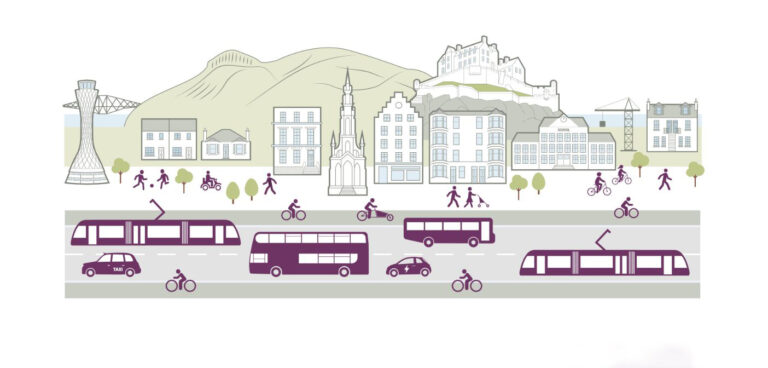The City of Edinburgh Council has published a 10-year plan to deliver a better connected, net zero carbon transport system and a healthier environment in the Scottish capital.
Subject to approval at a special meeting of Transport and Environment Committee on 19 February the City Mobility Plan will replace Edinburgh’s Local Transport Strategy, setting out a strategic approach to the sustainable and effective movement of people and goods to and around the city over the next decade.
Amongst measures included in the plan are the commitment to encourage a change in public behaviour towards the use of sustainable transport, the expansion of the tram and mass rapid transit network, improvements to bus routes, creating ‘mobility hubs’ in existing communities and new developments and introducing a city operations centre to monitor traffic.
Additionally, the plan pledges to create more liveable places less dominated by motor traffic and to build on the city’s network of walking, wheeling and cycling routes.
The final plan follows several years of engagement with the public, stakeholders and partners. Most recently, a consultation in 2020 gathered more than 1,800 comments on draft proposals with support demonstrated for all policy measures.
Following feedback, the City of Edinburgh Council said it had been able to strengthen and expand upon these policy measures, which centre around three themes: People, Movement and Place.
According to the council, the updated plan acknowledges the impact the Covid-19 pandemic has had on transport demands and mobility patterns, and how a green recovery can harness the associated effects of lower traffic levels.
Alongside the adopted Local Development Plan and emerging City Plan 2030, the City Mobility Plan also champions 20-minute neighbourhoods, an internationally recognised concept where local services are within a 20-minute walk of a person’s front door.
It also envisions neighbourhoods where people’s daily needs can be met within a 10-minute walk or wheel from their house.
Councillor Lesley Macinnes, transport and environment convener, City of Edinburgh Council, said: “The finalised City Mobility Plan recognises the need to revolutionise the way we move around the capital if we are to tackle the host of challenges we face, both locally and on a global scale.
“This is a bold, forward-looking strategy, befitting of this pioneering city, which will transform our streets, neighbourhoods and connections with the rest of the world for generations to come.”
In order to achieve its target of net zero emissions by 2030, the City of Edinburgh Council has set out a ‘Path to 2030’ and an implementation plan for policy measures that can be delivered in the short-, medium- and long-term.
By 2023, construction of a tram route to Newhaven will be complete and operational; a comprehensive review of bus routes in the city will have taken place; a Low Emission Zone will be in operation; the council will have introduced a Workplace Parking Levy, subject to consultation and approval; and council-owned public transport companies will have been reformed to offer better integration and value for money.
By 2025, a comprehensive mass rapid transit plan for the city and region will be completed, including new bus and tram systems; the business case for a north-south tram line will be agreed, linking Granton to the BioQuarter and beyond; a new bus route network will be in place; major streets will become increasingly traffic free; George Street will be transformed; the development of a strategic network of walking/wheeling and cycle routes will open up active travel; the 20-minute neighbourhoods concept will be starting to deliver local benefits.
And by 2030, the mass transit network, including tram, will have been extended west; the city’s seven park and ride facilities will have been upgraded; some arterial routes will be used for mass commuting by bike; the city centre will be largely car-free; a comprehensive city freight and servicing operations system will be in place; the implementation of the Waverley Station Masterplan will be underway.
Once in place, the implementation plan will be monitored and regularly updated. Its success will be measured against several objectives, including an increase in the number of trips made by active and sustainable modes of travel, ensuring transport options in the city are inclusive and affordable and the reduction of emissions from road transport.





